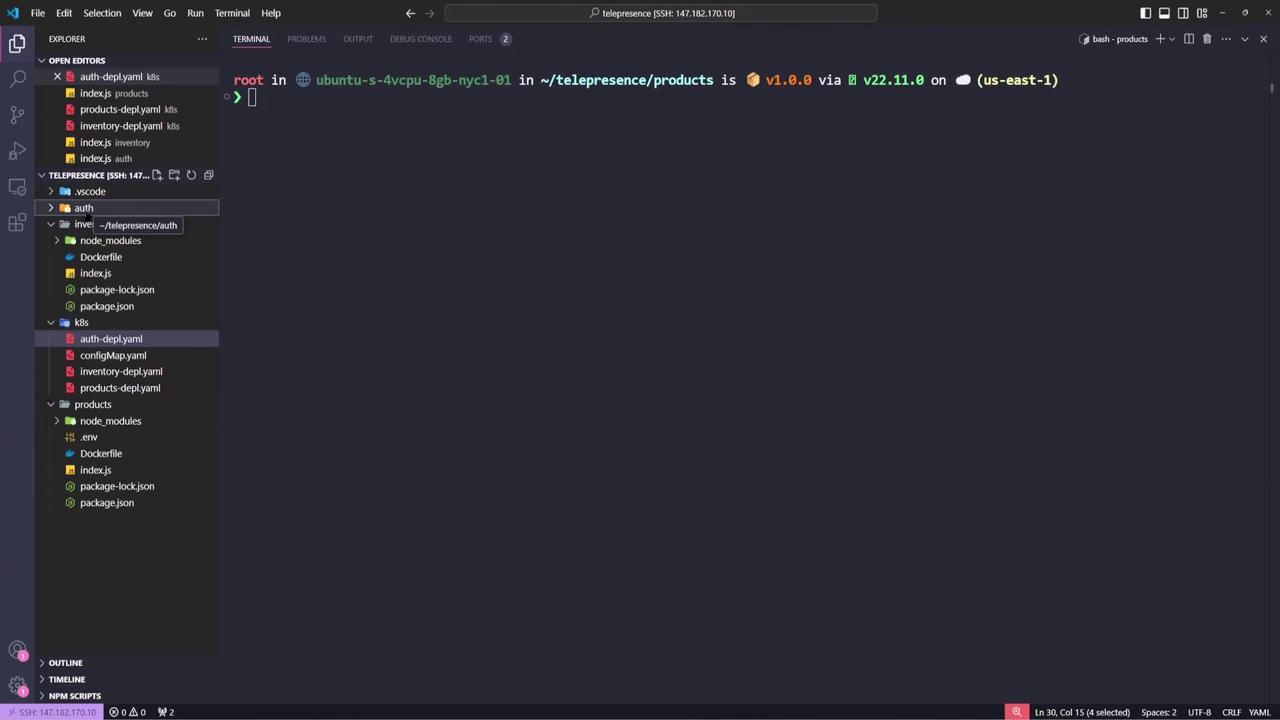Telepresence For Kubernetes
Telepresence For Kubernetes
Demo Telepresence Intercept
In this lesson, you’ll learn how to use Telepresence to intercept traffic from a Kubernetes service and run the workload locally for fast, iterative debugging.

Prerequisites
- A Kubernetes cluster and
kubectlconfigured to the correct context - Telepresence CLI installed (
brew install telepresenceor see the official docs) - Node.js (v14+) and npm
Note
Make sure your Kubernetes context is set to the target namespace, and you have permissions to create interceptions.
1. List Your Deployments
Identify the deployment you want to intercept:
kubectl get deployment
# Example output:
# NAME READY UP-TO-DATE AVAILABLE AGE
# auth-depl 1/1 1 1 4h55m
# inventory-depl 1/1 1 1 5h32m
# products-depl 1/1 1 1 4h47m
2. Create an Intercept
First, connect Telepresence to your cluster if you haven’t already:
telepresence connect
Then run:
telepresence intercept auth-depl -p 8000:3000
| Local Port | Container Port | Description |
|---|---|---|
| 8000 | 3000 | Auth service HTTP traffic |
Here’s the relevant snippet from the Kubernetes manifest:
# Deployment spec excerpt
spec:
template:
spec:
containers:
- name: auth
image: sanjeevkt720/telepresence-auth
ports:
- containerPort: 3000
name: web
---
apiVersion: v1
kind: Service
metadata:
name: auth-service
spec:
selector:
app: auth
ports:
- port: 3000
targetPort: 3000
You should see output similar to:
Using Deployment auth-depl
Intercept name : auth-depl
State : ACTIVE
Workload kind : Deployment
Destination : 127.0.0.1:8000
Service Port Identifier : 3000/TCP
Volume Mount Point : /tmp/telfs-1680244885
Intercepting : all TCP connections
3. Run the Service Locally
Switch to your local service directory and start the server on port 8000:
cd ~/telepresence/auth
npm install
npm run dev
Ensure your Express app listens on port 8000:
// index.js
const express = require("express");
const app = express();
const port = 8000;
app.get("/", (req, res) => {
res.json({ message: "auth service running locally via Telepresence" });
});
app.listen(port, () => {
console.log(`Auth service listening on port ${port}`);
});
4. Verify the Intercept
Use curl to hit the Kubernetes service name. Telepresence will route this to your local process:
curl http://auth-service:3000
Expected response:
{"message":"auth service running locally via Telepresence"}
5. Inspect the Pod
Observe both the original container and Telepresence’s traffic agent:
POD_NAME=$(kubectl get pod -l app=auth -o jsonpath='{.items[0].metadata.name}')
kubectl describe pod $POD_NAME
Look for two containers:
- auth (port 3000/TCP)
- traffic-agent (port 9900/TCP)
6. Remove the Intercept
When you’re done debugging, clear the intercept:
telepresence leave auth-depl
telepresence list
# Should report: No active intercepts
7. Switch to the Products Service
Stop your local auth service (
Ctrl+C)List deployments again:
kubectl get deploymentIntercept the products deployment:
telepresence intercept products-depl -p 8000:3000Run the products service locally:
cd ~/telepresence/products npm install npm run devVerify with:
curl "http://products-service:3000/?product_ids=1,2,3"
8. Debugging an Error
If your request hangs and you see:
TypeError: Failed to parse URL from undefined?product_ids=1,2,3
Inspect your route handler:
app.get("/", async (req, res) => {
try {
const productIds = req.query.product_ids;
const idsArray = productIds.split(",").map(id => parseInt(id, 10));
const response = await fetch(`${apiURL}?product_ids=${idsArray.join(",")}`);
// ...
} catch (error) {
console.error(error);
}
});
Warning
apiURL is undefined locally because the environment variable from the Pod isn’t set in your shell.
9. Import Environment Variables
To mirror the Pod’s settings, pull the env vars into your local shell:
# Fetch one of the app pods
POD_NAME=$(kubectl get pod -l app=products -o jsonpath='{.items[0].metadata.name}')
# Export all environment variables from the container to your local session
kubectl exec $POD_NAME -- printenv | grep API_URL | sed 's/^/export /' > pod-env.sh
source pod-env.sh
Now restart your local service so it picks up API_URL and any other Pod-specific variables.
Links and References
- Telepresence Documentation
- Kubernetes Services
- Express.js Guide
- Docker Hub: sanjeevkt720/telepresence-auth
Watch Video
Watch video content